Sen. Ann Rivers and state Rep. Brandon Vick hold conversations with constituents in Camas, Battle Ground and Ridgefield during post-session swing through the 18th Legislative District
BATTLE GROUND — Republican state Rep. Brandon Vick says he left the most recent session of the Washington State Legislature feeling as though he had just been “punched in the stomach.”
That less than pleasant feeling came as he contemplated what he and other members of the GOP see as damaging actions taken by Democrats who, after several years of sharing power with Republicans, took control of the state Senate and pushed their agenda behind the full power of all branches of state government.
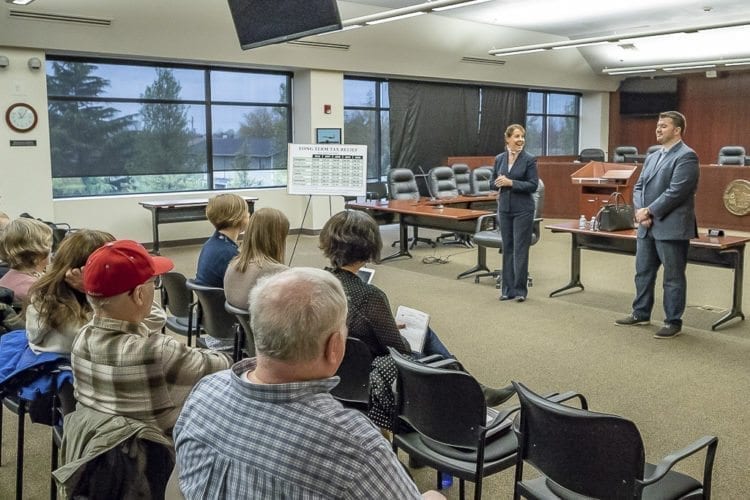

Shortly after he made the comparison of the situation to that of a body blow, 18th Legislative District constituents in attendance at a town hall meeting Saturday made sure Vick and fellow area lawmaker Sen. Ann Rivers, R-La Center, knew they are also feeling a bit roughed up.
Rather than partisan frustrations, though, it has been the stark increase in property taxes and other financial burdens that have many of them reeling as if they have just been placed at the wrong end of a violent haymaker.
The state of Democratic dominance in Olympia and escalating property taxes were just a couple of the topics discussed at Battle Ground City Hall during the second leg of a three-stop town hall tour that also brought the pair of local legislators to Camas City Hall and Clark County Fire & Rescue in Ridgefield.
The 15 or so attendees of the Battle Ground event held a polite back-and-forth conversation with their representatives for more than an hour, with comments ranging from disdain for Oregon’s plan to potentially toll Washington motorists to disappointment in the Legislature’s vetoed attempt to swiftly pass a law that would, in the eyes of many, effectively exempt them from many of the requirements of the state Public Records Act.
A punch in the gut and the partisan divide
While both Rivers and Vick were vocal in their belief that good policy was enacted despite Democrats having control of the House, Senate and governor’s mansion, they shared disappointment in a number of developments.
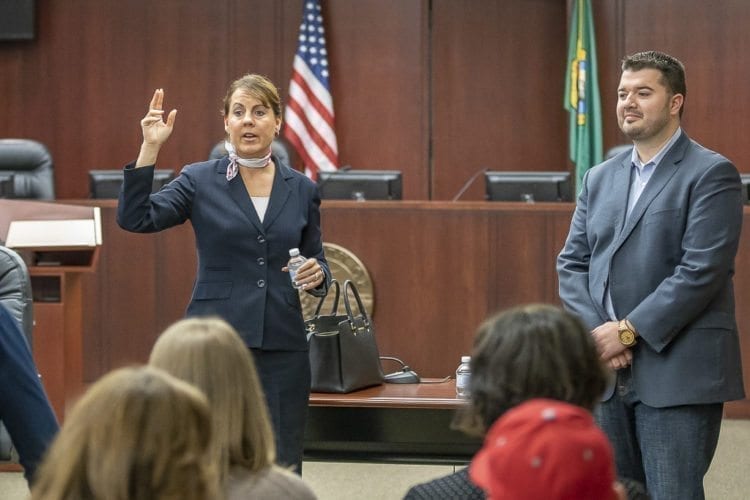
One such matter was that of Senate Bill 6199, legislation championed by Democrats that requires home health care workers to pay state labor-union dues to Service Employees International Union despite a 2014 U.S. Supreme Court ruling that found such quasi-public workers were not required to do so.
The law drew loud calls for a veto from Republicans and the Freedom Foundation, but it was ultimately signed into law by Gov. Jay Inslee.
“We unionized people who didn’t ask to be unionized,” Vick said.
Republicans in the House, including Vick, refused to vote on the measure after being gaveled down by the speaker on more than one occasion. The move was unprecedented, but Vick said he hopes to see an improvement in collaboration between the two parties in the next session.
Rivers and Vick both decried the Democrats’ decision to draw money out of the state’s rainy day fund despite the news that the state would receive $1.8 billion in unexpected revenue as the economy continues to improve.
“It came in, and we spent all of it,” Vick said of the unplanned revenue.
“And then some,” Rivers interjected.
Vick said the money is supposed to be used in emergency, set aside for when the economy takes a turn for the worse and extra money is needed in place of declining tax revenue.
“An emergency is not when we bring in an extra $1.8 billion,” he said, adding that he hopes wiser budgetary practices prevail before the arrival of another recession or downturn.
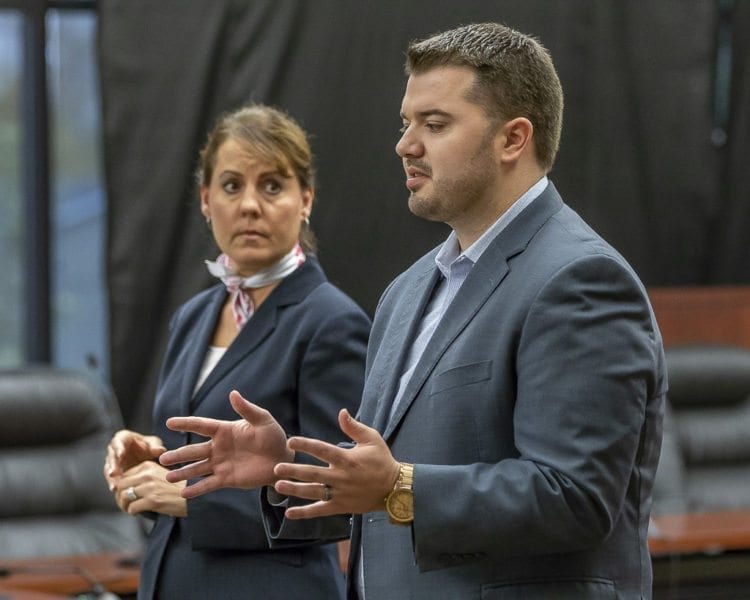
Rivers also lamented the move by Democrats to alter Initiative I-940, a measure that was submitted to the Legislature by citizens and aimed to lower the bar for prosecuting law enforcement officers under the state’s deadly-force laws. State law outlines the options for lawmakers when considering an initiative; they can take no action and send it to voters, adopt the initiative as law, or propose an alternative to run alongside the citizen proposal on the ballot. Instead, the lawmakers passed a separate bill that will amend the initiative when it becomes law in June.
Rivers said the legislative maneuver was not only “constitutionally unsound, but I believe it’s criminal,” expressing optimism the courts would side with those who share her belief.
While Rivers and Vick opened the town hall voicing their dissatisfaction with Democratic control of the Capitol, they struck an optimistic tone on more than one occasion, noting that positive legislation did make it to the governor’s desk in some cases.
Rivers highlighted a 30 percent rebate in property taxes in 2019 that was ultimately approved, though she said the relief doesn’t go as far or come as fast as Republicans had hoped.
Will Republicans take back control of the Senate?

When asked by an attendee whether Republicans could take back control of the Senate, neither Rivers nor Vick expressed much immediate hope for such a development.
“People are moving to independents,” Rivers said. “There are a lot of people who are disgusted with both parties right now.”
She said it’s not just politicians who seem to be moving closer to the center of the political spectrum, but constituents as well. Many are tired of partisan bickering at both the state and federal level, she said, and they simply want to see their lawmakers figure out compromises on the issues that divide them.
“I wouldn’t hazard a guess,” Rivers said of her party’s prospects for recapturing the Senate.
Vick alluded to the tumultuous political scene at the federal level and implied it could have an effect on state races as well.
He said regardless of the outcomes of elections, he believes the Republicans in the Legislature can work as an “effective minority” if indeed they are not swept back into power by voters.
“November will come and we’ll reshuffle the deck then,” he said.
Public records: ‘What make the 200 of you different?’
Battle Ground City Councilor Philip Johnson questioned the lawmakers on attempts to pass legislation that would have exempted themselves from elements of the state Public Records Act.
He noted what he considered to be undue criticism of Battle Ground’s own transparency by lawmakers in the past, along with the fact that his emails and those of his counterparts are all open to the public.
He asked, “What makes the 200 of you in Olympia different?”
Later, he asked, “Is sunshine coming your way or is sunshine for us and not you?”
Rivers acknowledged that she and others in the Legislature didn’t find out exactly what they were voting on until just days before it went to the floor. She said she was given a lot of information — presumably from party leadership — that turned out to be incorrect.
While she has concerns about protecting the private information of constituents who reach out in the form of emails and phone calls, she said her calendar and much of the other records connected to her office should be open to the public.
Rivers accepted that the rapid process the lawmakers used in an effort to pass a law exempting many of their records was flawed.
“There’s no way around it,” she said. “It was crummy.”
Ultimately, she said she believes she and her fellow lawmakers will eventually be held to the same standard as Johnson and other city councilors, school board members, county commissions and all other government bodies in Washington.
First, the Legislature must settle the lawsuit filed by media outlets seeking rulings that the lawmakers are not exempt from the law. She anticipates the cost of obtaining public documents will need to increase, noting that many individuals have bilked millions of dollars from local and state governments simply by flooding them with records requests and then suing when an honest mistake is made in meeting the requests.
Vick agreed the process should have been done better, though he saw promise in the fact that legislators were willing to open up correspondence with lobbyists and personal calendars for the public to view.
He said “it needed to be done better,” adding that now that the law has been vetoed, stakeholders can get together and find a solution.
Toiling with talk about tolls
One attendee asked whether local news coverage implying Oregon would press forward on plans to toll Washington drivers despite broad opposition was true.
Rivers pointed to the work of U.S. Rep. Jaime Herrera Beutler, R-Battle Ground, who was greatly disappointed to see an amendment addressing the matter and protecting her state’s residents removed from federal legislation that recently passed.
“She was really upset,” Rivers said. “She fought a yeoman’s battle. So that did leave it squarely on our shoulders.”
Gov. Jay Inslee seems to be OK with the proposal, Rivers said, adding that she and others in the Senate must work to send the message that “this is ridiculous.”
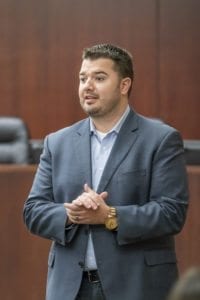
Vick noted that a bill passed by the state Legislature to address the issue wouldn’t provide a fix, so it all comes down to insisting on having conversations at the state and local level focused on the possibility of tolls while waiting to see what role the federal government might have.
He called Oregon’s pursuit of tolls a “screw you” to Washington.
Rivers said continued economic development on the north side of the river would also help combat the problem, as more family wage jobs created in Washington mean less need for residents to travel south in pursuit of a paycheck.
Vick said aside from Herrera Beutler, the simple fact is that many leaders outside of Clark County don’t care about the issue, naming Democratic U.S. Sen. Patty Murray specifically.
That prompted comment from John Ley, a Republican candidate for the position currently held by Rep. Liz Pike in the 18th District, who said it’s important that residents of Southwest Washington reach out to Murray and U.S. Sen. Maria Cantwell to let them know the matter is “hugely important.”
Property taxes and a ‘perfect storm’
Several town hall attendees voiced surprise and outrage at the continued spikes in property taxes over the past year, a trend that Rivers said was intensified through a combination of local bonds and levies being passed and continued attempts to fully fund education to meet the requirements of a ruling by the Washington state Supreme Court known as the McCleary Decision.
Rivers also claimed poor property assessment practices at the county level, and subsequent corrections increasing the value of Clark County properties, has played a role in the sticker shock some residents are experiencing.
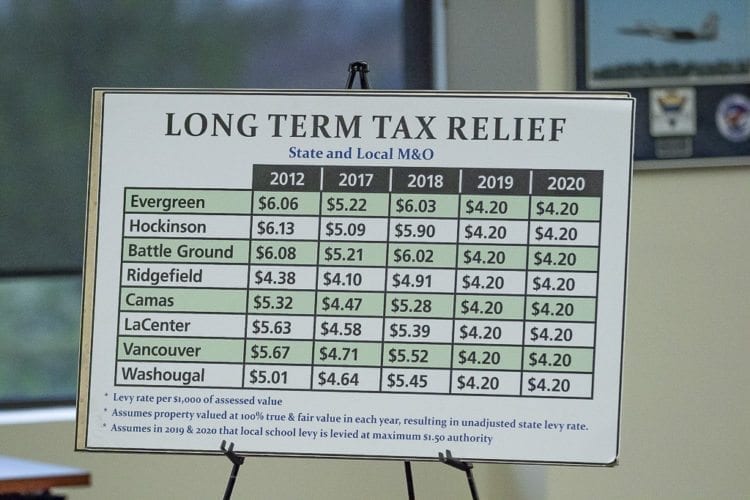
On the bright side, Rivers noted, lawmakers will provide a 30 percent rebate on 2018 property taxes next year. Additionally, after 2018, all local school levy rates will be dropped to a flat $4.20 per $1,000 in assessed value, bringing relief to taxpayers while providing more fairness when comparing rural and urban school districts.
She called the combination of factors leading to increased burdens for taxpayers a “perfect storm” and said that solutions must be as big and complex as the problem itself.
Rivers said the assessor’s office undervalued property in Clark County for a long period of time and that the correction to those numbers came at an unfortunate juncture.
“The correction has happened but unfortunately it came at a time when other bills were coming due,” she said.

Again, she also criticized Democrats for not falling in behind Republicans who sought full relief for taxpayers this year.
“We fought for 100 percent relief but our partners in the Legislature couldn’t get there,” she said.
Rivers said she was “horrified” by her own tax statement, a claim that seemed to be backed by her husband, who pulled up their statement and began reading down the list of about 15 taxing districts and governments that demand money due to the location of their property in La Center.
“Now ya’ll know what my pillowtalk is like,” Rivers quipped.
Vick said, along with all the other factors, the value of homes in Clark County increased by 15 percent, a fact that would itself lead to higher property taxes. He said he’s working on legislation that could become an initiative that holds the potential to solve many of the ails outlined by constituents.
He also said lawmakers in the region, regardless of party affiliation, must speak with one voice if they hope to be heard by power brokers in state and federal government.
He said there’s been a growing acknowledgment of the divide between rural and urban realities when it comes to the tax burden and other issues.
“We have to speak with one voice because that’s how you get noticed,” he said.




